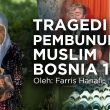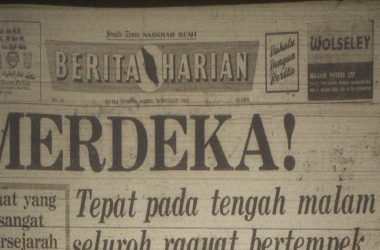Historical amnesia is a term used by Shashi Tharoor, an Indian MP, whereby he claimed that the British suffer from historical amnesia over atrocities committed by their former British Empire. The term is used in the study of history, culture and sociology whereby people forget major events, or trends, which were usually negative. This is so when very little context were included in the curriculum on British imperialism in the subject of history in schools. For example according to Shashi Tharoor, the industrial revolution in Britain was financed through the plunders of the Empire and only left India to become one of the poorest countries in the world.[1]
Interestingly, a poll conducted by YouGov in Britain found that 43% of the British public thought the British Empire was a good thing and 44% of the public thought the empire’s role on colonialism is something to be proud of. [2] This is somehow ironic when the British Empire is not widely taught in detail in British schools.Imperialism of the British Empire might be seen positive economically where infrastructure was invested upon, trading routes were established and institutions were installed. Nevertheless, the prime motive of these installations were to primarily benefit the colonizers. Despite all the investment on infrastructure, they also extracted resources, oversaw famines and in some cases left behind instability.
Another example of historical amnesia is through the absence of the Muslim’s contribution in the history of Western capitalism and civilization. In the case of British history of Malaya’s imperialism, exploitation not only happens in terms of political and economical but also intellectual imperialism. In economic terms, the colonizer exploited the raw materials such as rubber, which later on the latex was taken to England to produce tyres there and then were sold. By 1939, 40% of the world rubber and 60% of world’s tin was from Malaya.[3] What’s more is that, Malaya has been an instrumental supplier of rubber for the production of tyres to make automobile transportation during the world war.
To an extent, imperialism is argued to open doors for further development. It has led to the opening of large rubber estates, oil palm estates, tin mines and the establishment of large scale industry. Besides that, infrastructures and facilities were improved such as roads, modern towns, schools that led to economic prosperity. Nevertheless, the natural resources exploited were meant to sustain the British Empire in light of the industrial revolution. Racial relations were also generally disrupted and racial ideology was institutionalized.
Today, we are no longer under political and economic imperialism, but we may face another form of imperialism that persists until today – intellectual imperialism. This was parallel with economic and political imperialism where data was obtained and collected, which was later processed and manufactured in England in the form of books and articles and then were sold locally.[4] Thus, it is not unusual if our worldview was shaped not by our own experience and our own narrative but the narrative of others. Intellectual imperialism led us to suffer from historical amnesia where we no longer know and acknowledge major events, trends, contributions of our own civilization. If this persists, we will simply emulate and base our idealism upon Eurocentric idealism.[5]
This is not to suggest that globalization and the exchange of knowledge should halt but rather, one should know oneself, be practical and independent where we are able to shape narratives from our own tradition. This is because the starting point will always determine the future blueprint of the economic system, method of government, ideas of democracy, conception of welfare and many other critical issues. To what extent do we know about the contribution of the Malay civilization, for example, to the world of knowledge? To give an example, the Sejarah Melayu, a prominent politicohistorical text serves itself as an indigenous Southeast Asian contribution to theories of international relations. [6] In Sejarah Melayu, it contributes to the study of globalization where borders seem to be less visible today (except only recently) on how diverse people from different backgrounds might interact among themselves. To what extent do we know this?
Others have already started, when will we?
Different parts of the world have already started to question the dominant Eurocentric narrative. In the School of Oriental and African Studies (SOAS), for example have set up a campaign to “Decolonise Our Minds” by transforming the curriculum and include more non-Westerners thinkers and scholars as part of their curriculum. It is conventional that part of a philosophy module would teach Plato, Socrates, Locke or Kant but very little on non-Western philosophers. They started to question the lack of representation of indigenous non-western scholars hence wanted to do something about it. It is imperative that we revive our own narrative of history to cure the historical amnesia. There is a need to know who we are, our own identity, our legacy to shape our own worldview. As Tharoor said it, “if you do not know where you come from, how will you appreciate where you are going?
[1] http://www.independent.co.uk/news/uk/politics/shashi-tharoor-britain-india-suffer-historical-amnesia-over-atrocities-of-their-former-empire-says-a7612086.html
[2] https://yougov.co.uk/news/2014/07/26/britain-proud-its-empire/
[3] http://ww2db.com/battle_spec.php?battle_id=47
[4] See Alatas, “Intellectual Imperialism: Definition, Traits and Problems”, Southeast Asian Journal of Social Science 28(2000): 23-45
[5] Eurocentric is a notion that refers to European exceptionalism, a worldview that is centred on Western civilization and its experience.
[6] See A Chong, “Premodern Southeast Asia as a Guide to International Relations between Peoples: Prowess and Prestige in “Intersocietal Relations” in the Sejarah Melayu“, Alternatives: Global, Local, Political 37(2012): 87-105
Fatin Nadhirah Jamalolail
IRIS Researcher











